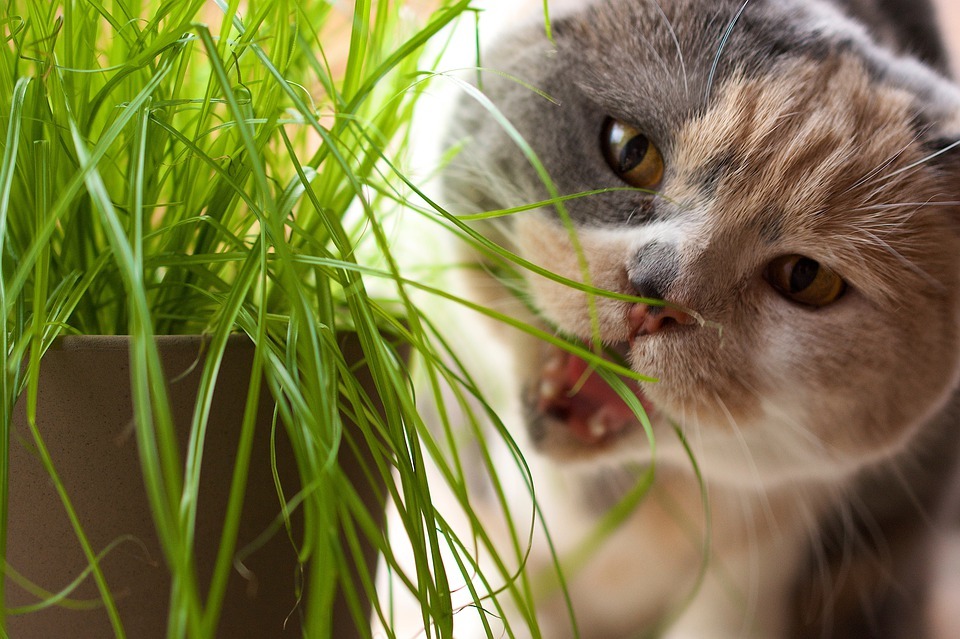If your kitty has been with you for some time, you may already know that they are “obligate” carnivores, meaning that they need meat to survive, and many of their nutritional needs are met by consuming other animals’ flesh. However, cats do a lot of quirky things. One of their obsessions is snacking on grass, only to vomit it back up a few minutes later. So, what’s with this behavior? Well, there are a few theories that imply gnawing on grass blades is actually beneficial for your feline companion.
1. Grass soothes an upset stomach
One of the most significant theories behind cats eating grass is that it helps relieve stomach aches. Being natural meat eaters, cats don’t have the necessary enzymes to break down grass, causing them to throw it up after eating it. With that, it is believed that kitties snack grass to induce vomiting and clear out anything indigestible from their systems, such as fur, feathers, and bones from their prey.
2. Grass juice has folic acid
Surprisingly, grass juice has folic acid, an essential vitamin present in a cat’s mother’s milk. This nutrient is vital to a cat’s well-being, as it helps in digestion, assists in the production of oxygen in their bloodstreams, and promotes cell growth.
Lack of folic acid may result in anemia. If a cat is nibbling grass, it’s possible that she needs a vitamin boost to counteract the deficiency. For kitties that never go outdoors, folic acid supplements can be added to their diet to ensure they never miss this nutrient. A vet can help where to get the best products.
3) Grass works as a natural laxative
There are cases that cats’ indigested food goes too deep in their digestive tract. With that, they need natural laxatives to pass it to the other end with ease. While thinner grasses help them regurgitate, broader grasses aid in their bowel movement and relieve constipation. Experts can only guess if this cat’s behavior is brought by intuition. But, these kitties surely know that they need grass to clean out their system.
4) Eating grass helps with anxiety
Like their human parents, cats also eat not only to ease hunger but also to relieve anxiety. Whenever they feel stressed, cats may engage in “emotional eating” to soothe themselves. They may also partake in other activities, such as vocalizing far from normal or overgrooming themselves. So, whenever you see your cat munching grass, accompanied by a sullen mood, it is best to visit the vet to ask for ways to help your cat cope up.
Is it safe for cats to eat grass?
Eating grass is fine for cats. However, it must be done in moderation. Gnawing too much grass may cause small fragments of grass to get inside their nasal cavity, leading to immoderate sneezing. Such a scenario may require a visit to the vet to have them taken out.
Another concern would be ensuring that the grass they eat is non-toxic and isn’t treated with pesticides. If you’re keeping your kitty as an indoor-only cat, you could grow a tray of pet-safe grass inside the home as an alternative. If you’re taking her outdoors, check where she is grazing to avoid her from ingesting poisonous or chemically-treated vegetation.
What types of grass should a cat eat?
Cat greens are available in local pet stores, including oat, barley, rye, and wheat grasses. These grasses are cat-friendly and are safe for cats to nibble on. While they do not have stimulating effects like catnip, cats will surely be enticed to them.
How much grass should a cat eat?
Each cat has a distinct way of how she would react to eating grass. If you offer them grass, some would be happy to eat them right away, while others may turn away their back as they don’t want or need it at the given moment. Undergoing a trial period can help you know how much they can tolerate. Try to limit them to a small amount of grass and observe how they will respond. If they seem to be okay with it and you see no issues, you may add gradual amounts moving forward.
Conclusion
All in all, we can infer that cats eat grass for the benefits it provides to them. However, be sure to check the potential reason why they do so. Through that, you can see whether they can still handle themselves or when it is already time for them to visit the vet.

